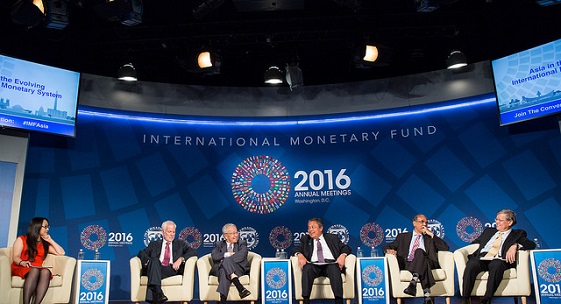
From left: Moderator Yanqing Yang, Barry Eichengreen, Eisuke Sakakibara, Perry Warjiyo, Duvvuri Subbarao, and Andrew Sheng (photo: IMF)
International Monetary System Ill-Equipped to Handle Global Problems, Asian Economists Say
October 7, 2016
- India’s Subbarao recalls 'carnage in our external sector’ in 2013
- Japan’s Sakakibara: 'secular stagnation’ may have arrived
- Need is seen for international monetary arbiter, bilateral swap lines
The international monetary system may be ill-equipped to deal with a host of modern problems, from climate change to abrupt shifts in capital flows across borders, according to current and former Asian policymakers at an IMF seminar in Washington, D.C.
Related Links
“There is no global safeguard mechanism for managing cross-border spillover impacts” when major central banks like the Federal Reserve shift monetary policies, said Duvvuri Subbarao, who served as governor of the Reserve Bank of India from 2008 to 2013. Subbarao recalled that during his tenure, the Fed’s easing policies caused capital to rush into India, pushing up the value of the rupee dramatically and harming the country’s competitiveness. Then, when the Fed indicated it might start to remove monetary accommodation in 2013, capital rushed out again, causing a 17 percent drop in the Indian currency in the course of four months.
“There was carnage in our external sector [in 2013],’’ Subbarao said at the high-level seminar on Asia in the Evolving International Monetary System at the IMF-World Bank Annual Meetings.
Secular stagnation
Eisuke Sakakibara, who as Japan’s vice minister of finance for international affairs in the late 1990s earned the sobriquet “Mr. Yen’’ for his impact on the exchange rate, highlighted the economic damage to some emerging market nations, including Russia and Brazil, caused by the decline in prices of oil and other commodities.
Sakakibara also touched on a central theme of this year’s Annual Meetings of the IMF and World Bank—the danger of long-lasting economic stagnation. In its World Economic Outlook report released this week, the IMF said global growth will remain subdued, and it warned that persistent stagnation could provoke more populist calls for restrictions on trade and immigration, which, in turn, would further hamper productivity, growth, and innovation.
“I am very much afraid that what Larry Summers called the period of secular stagnation may have started in the world economy,’’ Sakakibara said, referring to the former U.S. Treasury Secretary, who coined the phrase “secular stagnation” to describe a long period of slow growth. “International financial organizations need to take some measures to rectify the current very serious situation.’’
Climate change, inequality
Andrew Sheng, who formerly held senior positions at the Hong Kong Monetary Authority and the World Bank, said global action is needed to mobilize capital to fight climate change and mitigate the impact of growing inequality.
“When people designed the international monetary system, the financial system, we never thought about climate change,’’ he said. “We didn’t pay too much attention to income inequality either.”
But now, a time when major central banks’ policy rates are near zero or negative, “global income and wealth inequality are getting bigger and bigger,’’ he said. “It’s an issue that monetary policy needs to consider.’’
Volatile capital flows
The participants agreed that major central banks, and the Fed in particular, should pay more attention to the impact of their monetary policies on global financial flows, and how those flows affect less highly-developed nations.
With the Fed tightening policy while the European Central Bank is easing, “The divergence in monetary policies in the advanced countries has a huge impact on the emerging economies,’’ said Perry Warjiyo, deputy governor of Bank Indonesia. “At some point we have to cope with these very volatile capital flows.’’
Subbarao spoke of the need for an international body that would evaluate central bank actions and determine whether or not the domestic benefits for growth and employment outweigh the impact on other nations.
“And then there have to be rules for saying that you cannot pursue those policies, or you should not pursue those policies, or there should be some mechanism for sharing the burden of adjustment to such policies,’’ he said.
But Barry Eichengreen, a professor of economics and political science at the University of California, Berkeley, said he was skeptical that greater international cooperation would be possible, given that the Fed has a mandate to focus on the health of the U.S. economy.
“The world in which we live is one in which every country has to get its own monetary house in order,’’ he said. “The IMF can be useful, regional arrangements can be useful as information sharing devices, but I’m not optimistic about the scope for continuous, meaningful monetary policy coordination.’’
A stronger global financial safety net
Discussing whether the so-called global financial safety net—to help emerging and developing countries better cope with volatility—is strong enough, Eichengreen said that from a headline perspective it “looks pretty good’’ and that resources have grown compared with liabilities. Even so, he said, there’s still a stigma attached to turning to the IMF for assistance, which is typically done only when countries are in crisis.
One way to make the safety net stronger would to be to make permanent the bilateral swap arrangements adopted during the crisis, Eichengreen said. Other panelists concurred, noting that such swap lines, which are extended by major central banks to provide temporary liquidity to other central banks, could also be broadened to include more countries by conducting them via the IMF.


